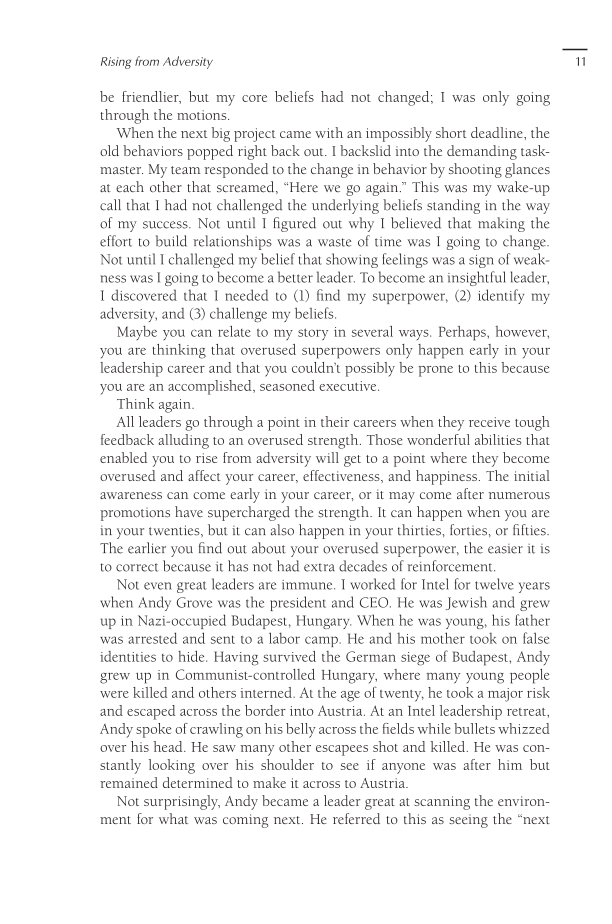Rising from Adversity 11 be friendlier, but my core beliefs had not changed I was only going through the motions. When the next big project came with an impossibly short deadline, the old behaviors popped right back out. I backslid into the demanding task- master. My team responded to the change in behavior by shooting glances at each other that screamed, “Here we go again.” This was my wake-up call that I had not challenged the underlying beliefs standing in the way of my success. Not until I figured out why I believed that making the effort to build relationships was a waste of time was I going to change. Not until I challenged my belief that showing feelings was a sign of weak- ness was I going to become a better leader. To become an insightful leader, I discovered that I needed to (1) find my superpower, (2) identify my adversity, and (3) challenge my beliefs. Maybe you can relate to my story in several ways. Perhaps, however, you are thinking that overused superpowers only happen early in your leadership career and that you couldn’t possibly be prone to this because you are an accomplished, seasoned executive. Think again. All leaders go through a point in their careers when they receive tough feedback alluding to an overused strength. Those wonderful abilities that enabled you to rise from adversity will get to a point where they become overused and affect your career, effectiveness, and happiness. The initial awareness can come early in your career, or it may come after numerous promotions have supercharged the strength. It can happen when you are in your twenties, but it can also happen in your thirties, forties, or fifties. The earlier you find out about your overused superpower, the easier it is to correct because it has not had extra decades of reinforcement. Not even great leaders are immune. I worked for Intel for twelve years when Andy Grove was the president and CEO. He was Jewish and grew up in Nazi-occupied Budapest, Hungary. When he was young, his father was arrested and sent to a labor camp. He and his mother took on false identities to hide. Having survived the German siege of Budapest, Andy grew up in Communist-controlled Hungary, where many young people were killed and others interned. At the age of twenty, he took a major risk and escaped across the border into Austria. At an Intel leadership retreat, Andy spoke of crawling on his belly across the fields while bullets whizzed over his head. He saw many other escapees shot and killed. He was con- stantly looking over his shoulder to see if anyone was after him but remained determined to make it across to Austria. Not surprisingly, Andy became a leader great at scanning the environ- ment for what was coming next. He referred to this as seeing the “next
Document Details My Account Print multiple pages
Print
You have printed 0 times in the last 24 hours.
Your print count will reset on at .
You may print 0 more time(s) before then.
You may print a maximum of 0 pages at a time.


















































































































































































